Southern Studies MA Alums in Publishing
This article, by Rebecca Lauck Cleary, appeared in the Fall 2016 Southern Register.
Writing from a Southern Perspective: Alums in Publishing
In different ways, these alumni are immersed in publishing, whether it is as an agent, an editor, an author, or working with a literary magazine.
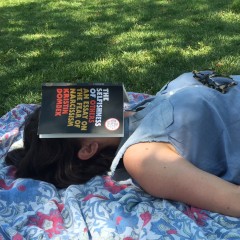
Duvall Osteen, a literary agent in New York City, says earning her Southern Studies degree was the best decision she’s ever made. “It’s helped me immeasurably, by teaching me how to apply broad thinking to a contained subject,” says the 2011 alum. “Like many graduate degrees, the ‘payoff,’ if you will, is personal growth through time spent learning, reading, thinking. The relationships I made in the program, and the innovative ways my professors pushed me to think about culture and history, are critical to how I interact with writers and evaluate manuscripts.”
Nicole Aragi founded Aragi, Inc. in 2002, and early on encouraged Osteen to become a full agent. “This is very much an apprenticeship industry, and with her guidance, I was able to begin representing authors. I’ve been a full agent for about two years now, and have a growing list of brilliant, thoughtful writers.”
The biggest misconception people have about agents is that they sit around reading all day. “No one reads at work, not even editors,” she said. “I left academia several years ago, and I ended up picking a career with even more homework! I read manuscripts in the morning before work, in the evenings when I get home, and pretty much all day either Saturday or Sunday, depending on my schedule. None of it happens on the job.”
Although it took her a few years to realize she could have a career working with writers, it was actually the only thing that ever made sense for her to do as someone who found reading both an escape and a joy. “Like all proper nerds, I’ve been a reader my entire life,” Osteen said. “My parents encouraged it—they were readers too. Nothing was too high- or lowbrow. They pushed me to read everything, and they never censored my choices.”
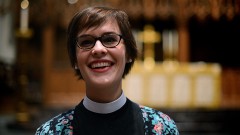
Sarah Condon, who earned her BA in 2005, always wanted to be a writer and said her Southern Studies degree has been a foundation to her career because it is where she learned to write well. “We did loads of writing, and we were always being challenged to try new ways of processing,” Condon said. “Also, my professors assigned so many great texts. I remember taking an entire semester on William Faulkner. Who has such a luxury? This contributed hugely to my confidence and abilities.”
Additionally, the degree had a major impact on her theology, which is important to the mother, wife, priest, and clergy spouse. “I really didn’t take many religion-themed courses in my time in the department, but consistently learning about the history of the South—with her narrative of sin and her longing for redemption—is really the story of my faith seen through the history of a place,” she said.
As associate editor of the Mockingbird blog, an online ministry founded in 2007 that seeks to connect the Christian faith with the realities of everyday life in fresh and down-to-earth ways via the Internet, Condon does much of her writing on the fly. “Late nights and early mornings are some of my most productive moments,” she said. “We record the weekly Mockingcast with about as much predictability. If it’s morning time, I’m at the microphone with a cup of coffee in hand. If we happen to be recording in the evenings, there is typically wine involved. It is hard to pin down a typical day.”
Tragedy brought her to Mockingbird Ministries a few years ago, and she compels people to look to Jesus for deliverance from their despair, comfort from their anxiety, and forgiveness for their sins. “I started writing for Mockingbird after the Boston Marathon bombings in April of 2013,” she said. “There was such an outpouring of positive thinking for humanity in that moment, and I needed to respond from a theological vantage point. What I wrote about that event is what I often see and enjoy writing about in the world around me. As intelligent, passionate, and well intended as we want to believe that we are, our hope, theologically speaking, comes from God. I see this same narrative happening on repeat in our cultural conversations.”
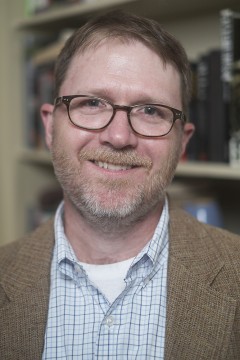
Albert Way, who earned his MA in 1999, is the incoming editor of Agricultural History and associate professor of history at Kennesaw State University. He has been interested in agricultural history, along with environmental history, since he realized it was a viable field during Ted Ownby’s seminar in rural history. “We read a number of landmark books on Southern agriculture, and I’ve been hooked ever since,” Way said. “When I entered the PhD program at the University of Georgia, I started going to meetings of the Agricultural History Society—one of the oldest professional history societies in the nation—and gradually became more involved until the opportunity came up to become the new editor of the society’s journal. I was lucky enough to have strong support from my home institution, Kennesaw State University, and the Agricultural History Society liked my proposal enough to offer me the job.”
Although he does not officially take over as editor until January, he is learning the nuts and bolts of running an academic journal, including receiving submissions and sending them through the peer-review process; brainstorming and soliciting special features such as roundtables and review essays; and learning and organizing the production and management of the journal. “We are moving to an online submission service, which will help reduce our administrative load in the long term, but requires a great deal of work in the short term, especially for a non-techie such as myself,” said Way, who also teaches Georgia history, US environmental history, a research seminar in US history, US history since the Civil War, and an occasional graduate class in environmental history. “Of course, my primary job as editor will be working with authors to shape their articles into quality pieces of academic writing. Smooth production and slick design might help attract readers, but ultimately quality content will keep them.”
Way’s enthusiasm for environmental and agricultural history comes from growing up in small-town south Georgia. “I grew up hunting and fishing and was always interested in the processes of working the land—the mix of work and technology, and the transformative results when those things converge, and I had great professors throughout undergrad and graduate school who encouraged me to pursue these interests,” Way said. His Southern Studies experience helped him figure out what graduate school and academia was all about. “I don’t exaggerate when I say it made me a more engaged citizen of the South and the world. It helped me learn how to read, think, write, and talk about serious things. And I learned a lot about beer and music, too.”
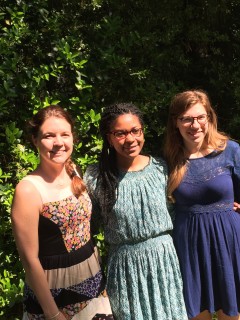
Sarah Ballard, an English teacher at Murrah High School for thirteen years, recently helped her students launch a literary magazine. The process began five years ago, when a student approached her with the idea to resurrect the school’s defunct creative-writing publication. “I went home one night and basically just Googled “Murrah Literary Magazine” and was shocked when all this info came up about their award-winning lit mag called the Pleiades,” Ballard said. “Eudora Welty had been a judge, and Richard Ford had published stories in it when he was at Murrah.”
Ballard also had an odd sense of familiarity when she realized her own father, a Murrah alum, had a poem published in the Pleiades when he was at Murrah, and it sat framed in her grandmother’s house. So she and a handful of energetic students set about to resurrect the magazine. “We wrote one letter to the alumni of Murrah asking for financial help, and the letter went viral,” she said. “Money started coming in from all over the country. We published our first issue that year, and it won second-best lit mag in the state (among many other awards) at the Mississippi Scholastic Press Association competition held at Ole Miss in the spring.”
Ballard, who earned three degrees from the University of Mississippi—BA in English in 2000, MA in Southern Studies in 2003, and MA in education in 2005—said the students on the Pleiades staff are creative, quirky, and dedicated, as it is a big part of their identity at school. “Because of the magazine’s cool ties to Murrah’s past, we’ve gotten a lot of attention for its resurrection,” Ballard said. “The quality of work— both written and visual—is amazing and has gotten a lot of people in the community to open their eyes to the talent of Murrah students. Most of the news Jackson Public Schools gets is negative, but we prove that our students are creating positive art and high-quality written works.”
Ballard plans on continuing to improve the publication every year and she enjoys how the students come out of their shells over the course of the three or four years they are on staff. “We work really hard to have our magazine fit our student population in design and theme,” she said. “The kids are so proud to have their work published in an actual magazine. It validates that they have legitimate and important things to say about their world and that people care about their ideas. My Southern Studies master’s degree set me on this path. I try and provide my students a safe place to express their own reality, which is vitally important to them and to me.”
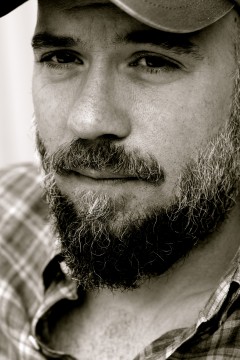
Odie Lindsey has been on the road this summer promoting his recently published book of short stories, “We Come to Our Senses,” which centers on men and women affected by combat directly and tangentially, and the peculiar legacies of war. “My first notes and sketches began with the 2003 invasion of Iraq. I’m a Desert Storm veteran (1991), so watching another generation mobilize for combat jumpstarted my thoughts about deployment, war narratives, and postwar life in the South,” Lindsey said. “So far the reception has been quite positive: starred reviews from industry trades, alongside very supportive newspaper and journal reviews. Eclipsing this has been the feedback from friends, colleagues, and the brave souls who bought the book without prompt!”
He said the book tour has been amazing, since he loves bookstores, but the writing process of finding war stories in day-to-day, postwar life was quite difficult. “In a sense, I had to bring the tension and unease of combat home; doing so meant losing sight of the things so often associated with a war narrative: acute bodily trauma or weapon-based action, obliterated landscapes, heroism, and the like,” Lindsey said. “Instead, my challenge was to explore the transition from taking on mortar fire to handling a jammed copier.”
His Southern Studies MA work is reflected both in on-the-page references and in the effort to write mindfully about the complicated South. “The Southern Studies experience was tectonic with respect to the challenge of writing noncombat-based war stories,” said Lindsey, who earned his degree in 2007. “Southern Studies pushed me to ask which war narratives were being overlooked; how memory functions with respect to Southern militarism or culture; which bodies earned cultural rewards for their service, and whether this reward jibed with the service itself. I thought about the nature of trauma, of representation in media. . . . I could go on and on.”
On top of being a fiction writer, Lindsey is a senior lecturer at Vanderbilt’s Center for Medicine, Health, and Society. “My primary contribution there is teaching medicine and literature courses. These sections center on novels (Larry Brown, Toni Morrison), short stories and essays, all of which have something to do with the body—whether physical or biological, or as applied to intersectional issues of race, ethnicity, gender, sexuality, et cetera,” he said.
Rebecca Lauck Cleary
